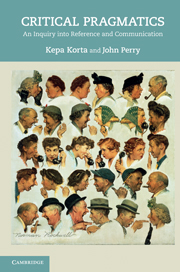Book contents
- Frontmatter
- Contents
- Preface
- Acknowledgments
- 1 Introduction
- 2 A short history of reference
- 3 Acts, roles, and singular reference
- 4 Elements of reference
- 5 Demonstratives
- 6 Context sensitivity and indexicals
- 7 Names
- 8 Definite descriptions
- 9 Implicit reference and unarticulated constituents
- 10 Locutionary content and speech acts
- 11 Reference and implicature
- 12 Semantics, pragmatics, and Critical Pragmatics
- 13 Harnessing information
- 14 Examples
- Bibliography
- Index
5 - Demonstratives
Published online by Cambridge University Press: 05 March 2013
- Frontmatter
- Contents
- Preface
- Acknowledgments
- 1 Introduction
- 2 A short history of reference
- 3 Acts, roles, and singular reference
- 4 Elements of reference
- 5 Demonstratives
- 6 Context sensitivity and indexicals
- 7 Names
- 8 Definite descriptions
- 9 Implicit reference and unarticulated constituents
- 10 Locutionary content and speech acts
- 11 Reference and implicature
- 12 Semantics, pragmatics, and Critical Pragmatics
- 13 Harnessing information
- 14 Examples
- Bibliography
- Index
Summary
Introduction
The demonstratives ‘this’ and ‘that’ occupy a rather intriguing place in the history of reference. At one point Russell thought they provided the only true names, what he called ‘logically proper names,’ ones which were not hidden descriptions, but directly picked out their referents, and contributed those referents to the propositions believed or expressed [Russell, 1912]. Demonstratives, used as logically proper names, had a rather limited use in Russell's view, however, since they serve only to refer to particulars and universals exemplified in one's sense data. Modern referentialism began with a focus on descriptions and names, then moved to indexicals, and more or less halted when it got back to demonstratives. Although Kaplan titled his monograph ‘Demonstratives’, indexicals dominate the discussion, and only indexicals are treated in the formal part. The monograph nevertheless contains a lot of thinking about demonstratives. Kaplan argues that they are devices of direct reference, and rejects a theory he develops to show how Fregean ideas might be applied to them: the Fregean theory of demonstratives. He adapts a part of that theory, the Fregean theory of demonstrations, but puts a direct reference spin on it. Our acts of pointing incorporate something like a Fregean Sinn, but it is the reference, not the Sinn, that gets incorporated into the proposition expressed. But he does not seem entirely satisfied with this theory, and adopts, or at least says he is inclined to adopt, a rather different one in the sequel ‘Afterthoughts.’
- Type
- Chapter
- Information
- Critical PragmaticsAn Inquiry into Reference and Communication, pp. 46 - 58Publisher: Cambridge University PressPrint publication year: 2011



